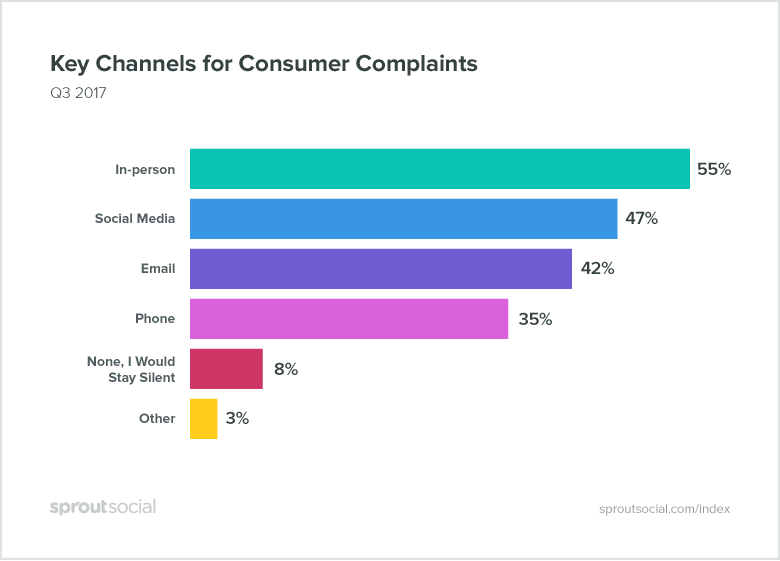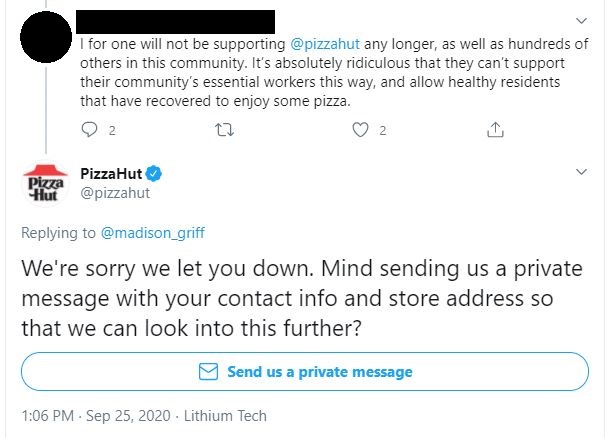When it comes to your business, negative talk online can hurt your brand and, if you let it go unchecked, cost you future customers. By managing comments properly, you can leverage them to your advantage. In this post, we share some tips to help you respond to negative social media comments. Note that these rules apply to your website’s blog as well!
7 minutes
As social media engagement grows, more and more consumers prefer to submit complaints and reviews on these channels. That means you simply cannot ignore social media and its effect on your business. With increasing numbers of consumers taking to their social media accounts, your business needs a strategy for responding to these negative comments. Here are some tips to help you get started.
Read More: 7 Ways To Level Up Your Social Media Strategy

Image Source: SproutSocial
Keep your eyes peeled
Having an online presence means you have to keep an eye on your accounts. Not only that, but you also need to keep tabs on any mentions of your brand online. On social media, people might not post their complaints directly on your Facebook page or use your @handle on Twitter. Make a plan to periodically check these mentions and search for your brand name online (services like Google Alerts can help you with this).
Reply in a timely manner
Whenever someone posts a negative comment or complaint, acknowledge the issue as quickly as possible. That means within a matter of minutes, someone on your team should be responding to the negative comment. If you can’t respond in 5-10 minutes, try for at least within one hour, because 42% of customers expect a response within that time. If you let it sit for too long, your customer might think you don’t care about them and you could lose them as a customer. Not only that, but other commenters might add kindling to the fire. And before you know it, the snowball effect will have created a huge PR mess.
Dedicate someone on your staff to check your accounts throughout the day. This way, you won’t miss anything big and can respond to any problems promptly. If you can’t afford to do this, check out management tools like Hootsuite, SproutSocial or Buffer. Most of these tools offer different pricing plans depending on your business needs.
Check your emotions at the door
It’s easy to let our emotions get the better of us, particularly when we receive criticism. That’s why it is important to take a moment to put your emotions aside before responding to any negative comments on your blog posts or social media pages. Remember not to take the comment personally, and try to see things from the customer’s perspective.
It is okay to feel upset or angry when a customer criticizes your business or makes false accusations. But it is not okay to project those emotions through your response. Validate your feelings, but compartmentalize them. If you respond angrily or confrontationally in haste, you could make the situation worse.
Read More: Should I Have A Presence On Social Media?
Once you’ve set aside your emotions, calmly think about the best way to respond. Your response is a public representation of what your company’s customer service looks like, so you want to make the best first impression you can. Take the time to carefully craft a response, because once it’s out there, it’s out there forever (even if you “delete” it).
Document everything
Whenever you receive negative or controversial comments on your social media pages, you should document them in some way. A great way to do this is via a screenshot of the post or comment. Make sure you stay on top of this, because users can edit and delete comments before you ever get a chance to see them.
Save your screenshots in a spreadsheet or document, along with the date. That way, if a situation ever escalates, you have proof of the original comment, your response to it, and any subsequent conversation that may have followed.
If you notice a certain customer constantly making negative comments, make a separate document to track that user’s behavior over time. Social customer service tools can help you keep track of past touchpoints with customers. That way, if they interact with your brand again, you know and understand their history.
Apologize sincerely
Take the blame, even when the problem wasn’t your fault. Most of the time, the customer’s point of view will differ from yours, so you need to see things from their perspective and craft the response they would like to see. The objective in responding to these negative comments on social media is to resolve conflict. Apologizing is one of the best ways to accomplish this.

People often lash out because of their frustrations. If you apologize sincerely and attempt to reconcile with them, you can preserve your brand’s reputation and show customers you really care.
Personalize your responses
The last thing a customer wants to hear when they’re not happy with you, is an automated response. Or worse yet, a copy-paste response that is the same for every customer. Make it a point to personalize your responses to comments. Here are a few ways you can make your response personal:
- Use the customer’s first name
- Have your support staff end the response with their own name
- Offer an individualized solution (more on this in a bit!)
Don’t ignore negative comments
If customers have problems, you should not ignore them. If you do, chances are you will lose them as a customer for good. Moreover, they will share that poor experience with their friends and family, and you will lose them as potential customers, too.
Respond to as many comments as you can, whether they are positive or negative. Especially if the customer has questions, don’t let that question hang in cyberspace. Show them you care by responding and trying to make things right.
Delete and/or block only when necessary
Unfortunately, some people only post negative comments because they enjoy causing trouble. We call these people “trolls”. Any interaction with a troll only validates and encourages their behavior. So what do you do?
Legitimate complaints from customers should not be ignored. But if their claims are entirely without merit, or if they are violent, hateful, or slanderous, you should ignore them. Alternatively, you can leave a single response saying that their comment is unfair, inaccurate, unfounded, etc. This gives the rest of your customers the real truth.
We recommend you proceed with caution either way. Document comments from trolls carefully. And if they cross the line, delete the comments and block the user. You could also delete the entire post altogether, to avoid alerting the troll.
Offer a solution
Our final tip in dealing with negative social media comments is offering solutions in your responses. Customers want to know that you will solve their problem for them, whether that means you’ll get them in touch with support, process a refund, or offer them a coupon for a complimentary dessert the next time they visit your restaurant.
But make sure you analyze the problem first to avoid making false promises. Don’t rush into responses and offer that free dessert to every single person who has a problem with your business. A great way to handle this is to apologize and ask the customer to reach out to your support team (or to you directly, if you have a smaller business). That way, you can learn more about the situation and offer a more personalized solution to their problem.
Wrapping up
Being active on social media is a must these days. In order to properly manage your online reputation, you have to keep tabs on conversations mentioning your brand. Make sure you respond in a timely manner to as many comments as possible, and avoid automated, copy-paste responses. Apologize when you screw up and keep your emotions in check. Lastly, keep record of all negative comments and messages. And know when to block or delete!
Have any other tips for responding to negative comments on social media? Let us know in the comments below!
Keep Reading: How Social Media Can Help Your Small Business

